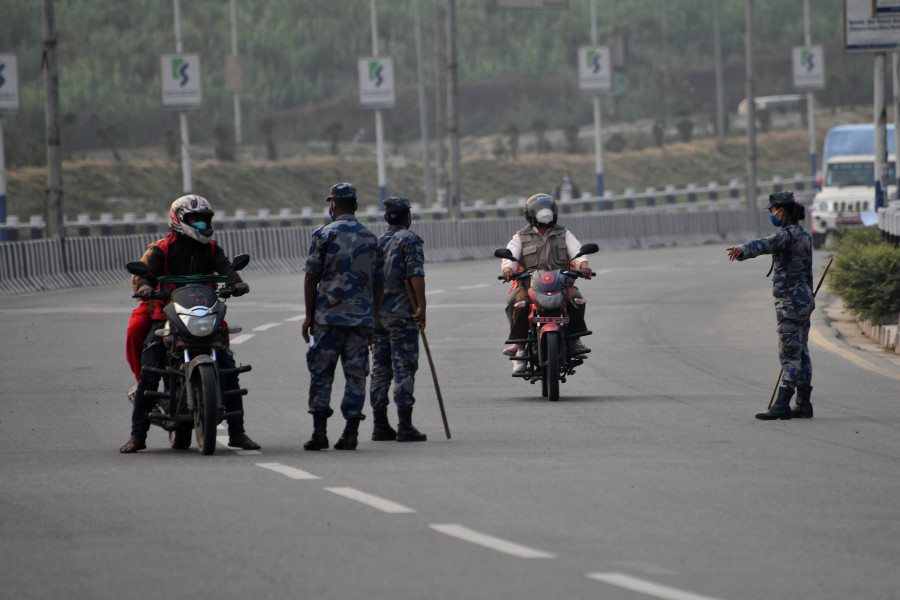Editorial
Lash of a lockdown
It’s the decline in the moral foundation of Nepali politicians that is causing this situation.
Mid-March, the Ministry of Health and Population issued a statement advising the public to remain vigilant as Covid-19 cases resurged massively in India. Avoid rallies, social events and places that see large gatherings of people, the statement warned. Anticipating a spillover given the porous border with India, the ministry also directed provincial health agencies to take necessary measures to prevent and prepare for another wave of the pandemic. The ministry instructions were clear—conduct malaria rapid diagnostic tests and antigen tests for returnees reporting fever, manage treatment for positive cases, reactivate quarantine centres, and conduct contact tracing by identifying hotspots.
Fast forward to April-end, the reproduction rate of Covid-19 in the country stands at 2.09, with the government reporting close to 5,000 new infections daily for three days in a row. Active cases in the country have surged to 34,117 with an increasing number of hospital admissions and severe cases. The Health Ministry has reported 216 deaths this month alone, 35 deaths in the last 24 hours, pushing the death toll to 3,246. In March, when the ministry issued its warning, active cases stood below 1,000, and daily new infections were below 150. The situation which is deteriorating by the day is but the failure of authorities to enforce containment measures and improve hospital resources, and public indifference to preventive measures and the safety of others.
As lapses and complacency reigned supreme at various levels, both the government and the public failed to abide by the science guided checklist of the pandemic playbook. There are no quarantine centres for thousands of Nepali workers who continue to cross the border in the wake of a disastrous resurgence of the coronavirus in India. As opposed to best practices, testing is sorely inadequate, and tracing is negligible. Lack of a surveillance system and the government's failure to preplan is now filling up hospitals fast, both in the Kathmandu Valley and emerging hotspots near the Nepal-India border which are short of health workers and hospital resources, and are not ready to handle what’s coming.
In Birgunj, Covid-19 patients are sharing beds as new arrivals overwhelm hospital capacity. As new cases increase, there is already a shortage of health workers for the smooth operation of isolation wards. The situation is similar in Pokhara, where hospital authorities are struggling to operate the limited intensive care unit (ICU) beds, high-dependency unit (HDU), ventilators and oxygen plants because of the shortage of health workers and trained human resources.
In Sudurpaschim Province, where hospitals struggle to provide essential services, a shortage of health workers and lack of hospital resources is killing people as caseloads increase. Health workers fear the situation will get worse before it gets better. Managing the worsening situation with more infectious variants of the coronavirus in transmission will require the government to act on a war footing. The leadership has to drop petty political games and mobilise all national and international resources to save lives and get the country out of this crisis. We’ve already lost precious time to prepare for the crisis that we knew was coming. In the wake of an alarming surge of new cases and deaths, the government was compelled to impose stringent restrictions in various parts of the country. By all accounts, we know that these measures will, to a certain extent, curb the further spread of infection; but this is a window to enhance our preparations against the pandemic.
The ruling and opposition parties should immediately focus their attention on this national emergency and come together to make crucial decisions to contain the situation. It is a priority that the Oli administration and politicians can no longer overlook. People are dying and struggling for their lives every day, but more than the coronavirus, it’s the decline in the moral foundation of Nepali politicians that is causing this entirely avoidable situation. The lash of a lockdown cannot be the government’s answer to this crisis.




 13.12°C Kathmandu
13.12°C Kathmandu














